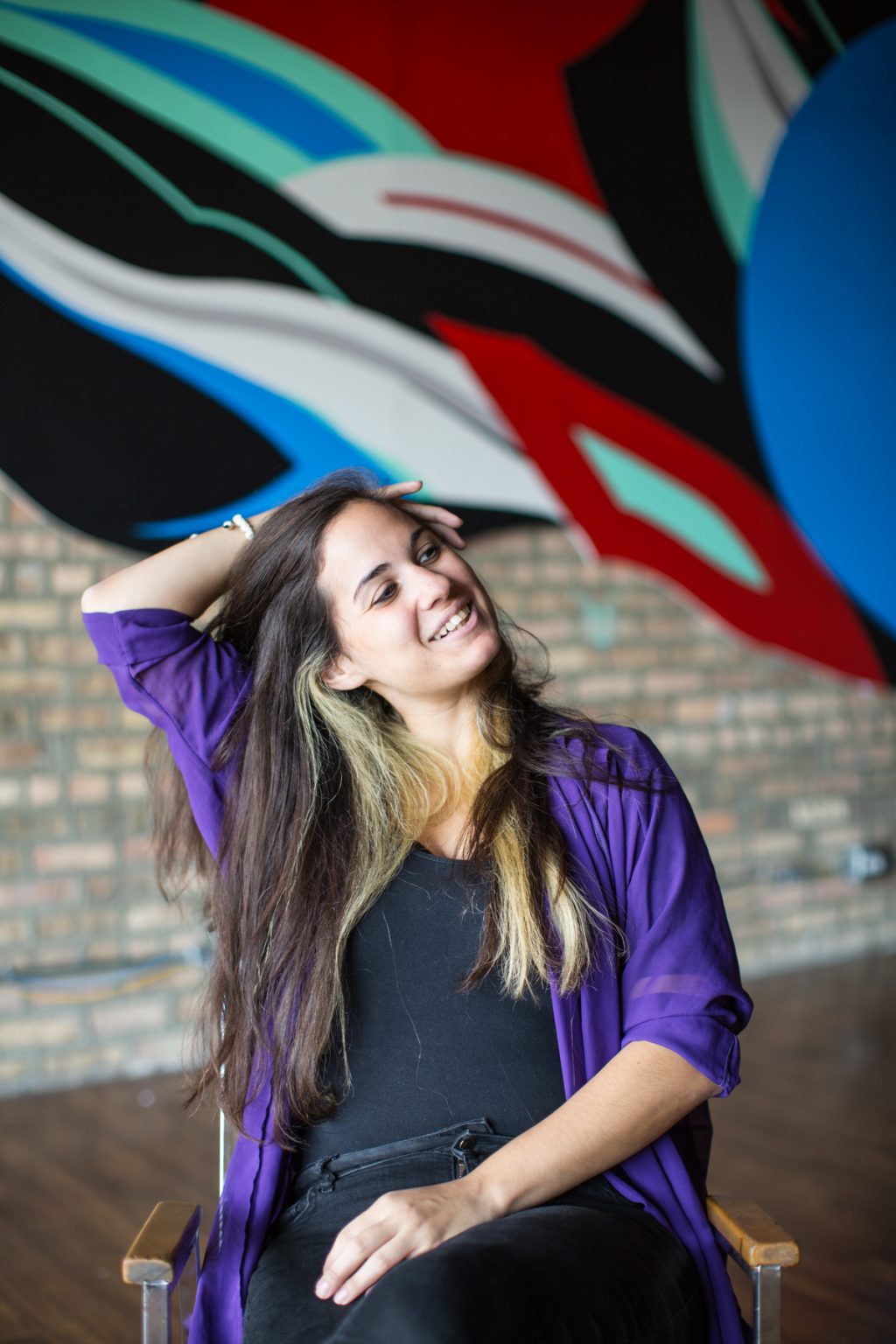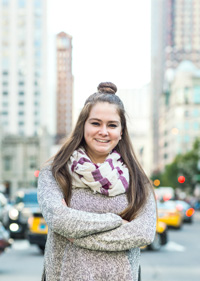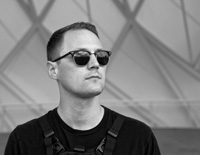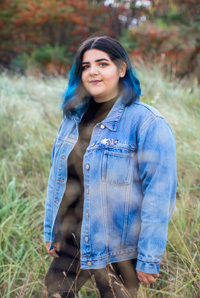
Live Wire Act
From working festival circuits to touring with pop stars, these six alumni bring live music experience to life.
By Audrey Michelle Mast ’00
While record labels experience declining sales in the age of streaming media, live concert revenue is booming. Music festivals and other live events are, in many ways, the nexus of culture. They might be ephemeral, but they’re visceral and authentic—and most importantly, shareable on social media.
Behind the scenes, Columbia College Chicago alumni are bringing those experiences to life. We talked with Jenny Beaulieu ’15, Anjel Lopez ’15, Chris Hemstreet ’10, Eric Loff ’08, Alex Bilancia ’10 and Aaron Sweatt ’13 about what it’s really like backstage. Whether they’re working the festival circuit or for a local venue, touring with pop stars or creating one-of-a-kind experiences for big brands, these six alums are pumping up the volume.
 Alex Bilancia ’10 is a freelance production coordinator whose clients include React Presents as well as Riot Fest and Young Chicago Authors’ Louder than a Bomb Fest. In her role as a transportation coordinator, she might manage 10 drivers and more than 80 runs a day from airport to hotel to venue for dozens of artists and crew. As a hospitality coordinator, she ensures that green rooms are stocked and riders satisfied for scores of bands during a festival’s three-day run.
Alex Bilancia ’10 is a freelance production coordinator whose clients include React Presents as well as Riot Fest and Young Chicago Authors’ Louder than a Bomb Fest. In her role as a transportation coordinator, she might manage 10 drivers and more than 80 runs a day from airport to hotel to venue for dozens of artists and crew. As a hospitality coordinator, she ensures that green rooms are stocked and riders satisfied for scores of bands during a festival’s three-day run.
A Day in the Life
“Each day of each show or festival is different. I’m responsible for coordinating all artist transportation surrounding a festival—getting them from the airport to the hotel, to the site [and back]. But there can be a lot of other factors involved: transportation for an artist’s crew, for their sound or lighting checks, if they’re on different flights or at multiple hotels for larger groups, if there’s an aftershow. Each moment in between is about managing these elements and all the inevitable changes as they happen. If you’re working with multiple artists and a set number of runners, something as simple as a 30-minute flight delay could potentially set off a chain reaction and affect your entire day’s schedule. It’s all about staying organized, proactive and effectively reactive for whatever comes up.”
 Jenny Beaulieu ’15 works in business development for Metronome, a Chicago-based marketing, sales and event production company. Recent projects include community outreach for [Pilsen’s Latin alt-rock] Ruido Fest as well as coordinating food vendors for Riot Fest in both Denver and Chicago. She previously staffed the box office at Concord Music Hall, interned for the Windish Agency and Live Nation and even worked the door at a nightclub in her hometown of Boston before she was old enough to drink. “You can’t be in the door if you’re under 21, but you can work it,” she says.
Jenny Beaulieu ’15 works in business development for Metronome, a Chicago-based marketing, sales and event production company. Recent projects include community outreach for [Pilsen’s Latin alt-rock] Ruido Fest as well as coordinating food vendors for Riot Fest in both Denver and Chicago. She previously staffed the box office at Concord Music Hall, interned for the Windish Agency and Live Nation and even worked the door at a nightclub in her hometown of Boston before she was old enough to drink. “You can’t be in the door if you’re under 21, but you can work it,” she says.
A Day in the Life
“When I was working on Ruido Fest, I was looking for community organizations to get involved working out a partnership, welcoming them to the fest, putting them on site with us. A month ago, I was bookkeeping and now I’m the food vending coordinator for Riot Fest. I make sure [the vendors] are all licensed and that they all know where they’re going and at what time. I get them permits to use city water. We also get involved with our neighbors. We don’t want to come in to a place and leave it worse than when we found it. We make sure everybody feels welcomed.”
 Eric Loff ’08 is the lighting director at Concord Music Hall, where he creates lighting schemes customized for individual bands and tailored to the energy of audiences. “I’ve always been fascinated with light,” says Loff, an animation major who originally planned to pursue CGI lighting and compositing. “I still get to use the principles that I learned at Columbia—about light, color, composition and lighting people. Instead of being filmed, it’s being seen live. You’re not drawing and creating characters, but you have your scene, which is the stage.”
Eric Loff ’08 is the lighting director at Concord Music Hall, where he creates lighting schemes customized for individual bands and tailored to the energy of audiences. “I’ve always been fascinated with light,” says Loff, an animation major who originally planned to pursue CGI lighting and compositing. “I still get to use the principles that I learned at Columbia—about light, color, composition and lighting people. Instead of being filmed, it’s being seen live. You’re not drawing and creating characters, but you have your scene, which is the stage.”
A Day in the Life
“I’m in charge of our lighting equipment, making sure it’s operating, fixing things, cleaning things. If we have a show at Concord, and that tends to be about two to three days a week on average, then it’s programming the lights for shows, running the shows. We average 10-12 hours in a day.”
 Chris Hemstreet ’10 is a freelance production manager currently working for marketing consultancy firm NCompass International. His career highlights include producing the North Coast Music Festival and Red Bull Sound Select in Chicago. He also has helped create several promotional events for Bud Light, including a “takeover” of Catalina Island called “Whatever USA” and a fan experience at last year’s Super Bowl.
Chris Hemstreet ’10 is a freelance production manager currently working for marketing consultancy firm NCompass International. His career highlights include producing the North Coast Music Festival and Red Bull Sound Select in Chicago. He also has helped create several promotional events for Bud Light, including a “takeover” of Catalina Island called “Whatever USA” and a fan experience at last year’s Super Bowl.
A Day in the Life
“My day-to-day is a lot of meetings and site visits. I work in production so a lot of it is tech-heavy logistics. There are a lot of booking conversations, a lot of budget conversations. You’re dealing with constrained timetables and small footprints, for the most part. You have a lot of moving parts, and you need to be pretty detailed.”
 Anjel Lopez ’15 is an event, festival and tour freelancer who recently toured as a VIP representative for both Pitbull and Meghan Trainor. She has also worked in the box office at Concord Music Hall, as a logistics assistant for React Presents and in a variety of roles for Riot Fest. “I would like to tour manage eventually,” she says. “I’m learning the skills in terms of doing all these different gigs but I’m just kind of going with the flow. As a freelancer I’m kind of always on the hunt for the next thing.”
Anjel Lopez ’15 is an event, festival and tour freelancer who recently toured as a VIP representative for both Pitbull and Meghan Trainor. She has also worked in the box office at Concord Music Hall, as a logistics assistant for React Presents and in a variety of roles for Riot Fest. “I would like to tour manage eventually,” she says. “I’m learning the skills in terms of doing all these different gigs but I’m just kind of going with the flow. As a freelancer I’m kind of always on the hunt for the next thing.”
A Day in the Life
“It changes depending on what I’m working on. Typically, I would say it’s a lot of waking up super early, getting coffee, answering a ton of emails. As the VIP road representative for Pitbull, I’m dealing with venue folks every day, advancing security, making sure I have the proper space for the event that I’m throwing, making sure that my guests are having a good time. Lots of running around the venue or festival site, and then doing the same thing all over again the next day.”
 Aaron Sweatt ’13 is a production assistant for Optimist Inc., working on sponsored events like Nike’s #GetOutHere, as well as an artist liaison and runner for festivals like Riot Fest and Spring Awakening. He is also a talent buyer for House Call Entertainment, booking acts for Logan Square Auditorium, Township and local street festivals. In July he managed a month-long tour for Afrobeat-jazz ensemble Antibalas. “My first jobs in the industry led to where I am now,” he says. “Every job builds upon itself to become something greater than [I did] the last year.”
Aaron Sweatt ’13 is a production assistant for Optimist Inc., working on sponsored events like Nike’s #GetOutHere, as well as an artist liaison and runner for festivals like Riot Fest and Spring Awakening. He is also a talent buyer for House Call Entertainment, booking acts for Logan Square Auditorium, Township and local street festivals. In July he managed a month-long tour for Afrobeat-jazz ensemble Antibalas. “My first jobs in the industry led to where I am now,” he says. “Every job builds upon itself to become something greater than [I did] the last year.”
A Day in the Life
“I mainly work in Artist Relations. A lot of times it’s as an artist liaison—which is essentially making sure the artist makes it to the correct stage and meets the stage manager, backline guy or gal [and so on]. It’s also our job to make sure their green room is set up and they have what they need to make for a successful performance.”
DEMO: How has the music industry changed in recent years?
Hemstreet, event production: Brands are changing how they’re trying to engage with consumers. They [once] were fine with putting out print ads and commercials that just get blanketed towards whoever’s watching. Now, they’ll spend the same amount of money, but they target the consumers they’re actually reaching out for by booking talent that represents those customers’ interests. By putting on unique events that you can build a video around, you can build the brand.
Beaulieu, festival development: When I first came to Columbia I thought I wanted to do A&R [Artist & Repertoire]—finding the music for record labels. But honestly, festivals are booming and record labels aren’t doing so hot right now. I couldn’t imagine myself trying so hard to find something I was passionate about and then try to lobby it to other people. That didn’t seem like something I wanted to do. Now, I see people taking live events to a new level. VIP experiences are greater than they’ve ever been. Also, there is always a new company that wants to access audiences and needs to break through on something other than TV or radio. They’re looking for experiences that are meaningful.
DEMO: What might surprise people about working in this field?
Bilancia, transportation coordinator: The intensity of the work and the level of professionalism that is expected. It can be fun, but it’s not just a constant party—we’re there to get a job done.
Beaulieu: How small of a group it actually takes to make these things possible. The core Riot Fest office is probably no more than 10 people. Also that we always love music, still. Nobody really tires of it.
Loff, lighting: How much we all depend on each other as a team. We trust each other. We watch each other’s backs. Audio guys need me to provide lights and I need audio, for obvious reasons, to be able to do my job well. Security has our backs and we need to back them up as well. We’re all dependent upon each other. We need marketers and promoters to do their jobs well so people come to shows, we need management to tell us what we need to know. It’s one gigantic team effort that’s pretty much make or break every day. The show has to go on, and it will. How well it goes really depends on everyone being able to communicate, on every level.
“Everyone can find a point in life when music has been this uplifting experience.”
DEMO: What do you love about your job?
Beaulieu: I love getting community organizations involved. It’s one of my true passions. [Music] is so universal. Everyone can find a point in life when music has been this uplifting experience. It’s otherworldly. To have the opportunity to be a part of that, I’m honestly grateful.
Bilancia: How things are constantly changing. I’m regularly faced with new challenges and meeting new people, so I always feel like I’m learning something new. Managing transportation for a festival or big show is like working on a giant puzzle. I also love the environment—being able to work in a place where I can be myself, surrounded by music and creative people who love what they do is inspiring.
Loff: The nights when I run lights to the music, to the crowd—I really live for those nights. I enjoy the camaraderie, the teamwork, the unpredictability. I love the physicality of it, too. I’m pushing and moving large items so it’s a good workout. Also: free music!
Lopez, VIP coordinator: I love that every job that I work is different—I’m on new event sites or new cities every day. Because I’ve seen things run in a lot of different ways, I’m a better employee. I can pick and pull the best elements and put them into my job.
“It’s one gigantic team effort that’s pretty much make or break every day. The show has to go on, and it will.”
DEMO: What are your biggest challenges?
Bilancia: When you’re dealing with multiple time-sensitive problems at once, things are thrown at you from all directions and there’s a lot of pressure to make it work, often when you’re mentally [and] physically exhausted. But I love what I do and it’s always worth it to figure out a solution.
Lopez: The crazy long hours. Often I’m working 18 hours a day. Then I come home, sleep for like, five, and get up and go back. But the pros definitely outweigh the cons for me. That’s why it’s easy to keep doing it.
Sweatt, artist relations: I’ve played in bands for the past 15 years, so I understand what artists are looking for in most situations. This helps when it comes to understanding their headspace, but sometimes it can be a little challenging if we’re working with a diva. At the end of the day, we’re dealing with hospitality and it’s important to know your role and why you’re getting a paycheck.
Hemstreet: In this industry you really have to hustle. With events, everything’s last minute. There’s always something that’s lingering over your head. Working under that kind of pressure is fine, and I’ve realized I’m good at it. It’s not my favorite thing to be constantly pulling your hair out, wondering if everything’s going to line up. You find out pretty quick that it always does—if you have the right work ethic. You build up positivity and confidence and go from there.
“I’ve always wanted to work in the music industry in some capacity, and college gave me the tools to make it a reality.”
DEMO: What’s the weirdest thing that’s ever happened during one of your events?
Hemstreet: I was stage-managing a festival, and I got a call from the headliners maybe four or five hours before they were supposed to go on. They said they flew to the wrong city. I didn’t even know that was possible but apparently it was, and they weren’t going to be able to play. We ended up making it work but we had to shuffle stuff around all in about an hour. It was such a weird thing to have happen and always sticks with me, especially when somebody asks me in a [job] interview, ‘What was a time when something challenging has happened and how did you deal with it?’
Lopez: Music festivals definitely have the crazier moments. Lots of fence jumpers. I feel like music festivals are a rite of passage for young people today. It’s like their first big concert experience, so they want to do everything, try everything.
Sweatt: One of the best lessons I’ve learned is not to drive a golf cart too fast when you have an artist who “heavily partied” right before getting on!
DEMO: How did Columbia prepare you for your career?
Loff: As an animation student, I learned the value of planning ahead, working ahead, working things out on paper, working together as a team to create a product, at a certain time on a budget. That’s a huge part of animation. But instead of dealing with a one-or two-year deadline, we have eight to nine hours. It’s just greatly condensed, but the principle is the same.
Lopez: I owe Columbia everything, in terms of my career. I’ve always wanted to work in the music industry in some capacity, and college gave me the tools to make it a reality. It’s very helpful that Columbia has professors working in the industry. They have relevant connections that are very helpful to students, in terms of internships and jobs. I was on the Student Programming Board. It helped me meet new people who saw my passion, and saw where I wanted to go. It gave me the basic tools I needed to do this for a living.
Hemstreet: We went down to South By Southwest [with AEMMP Records, Columbia’s student-run record label]. I was completely wide-eyed. It was quite the experience overall. We won an award, too: the best student-run record label for that year (2010). My overall experience with Columbia was great. You’d be surprised—no matter where you are in this industry, you always find somebody who went to Columbia.
Bilancia: I’m a firm believer that you get out of Columbia what you put into it. You can take the classes, get your degree, go home and be done. Or you can ask for more, get involved, delve deeper into the community and see all the places it takes you. There are endless opportunities through Columbia, but you have to want them. The hands-on experience gave me the confidence to join the school’s Student Programming Board, which opened up a whole new network of people and opportunities. From there I had the experience and recommendations I needed to get an internship with a major event production company in Chicago, and my career has snowballed from there.